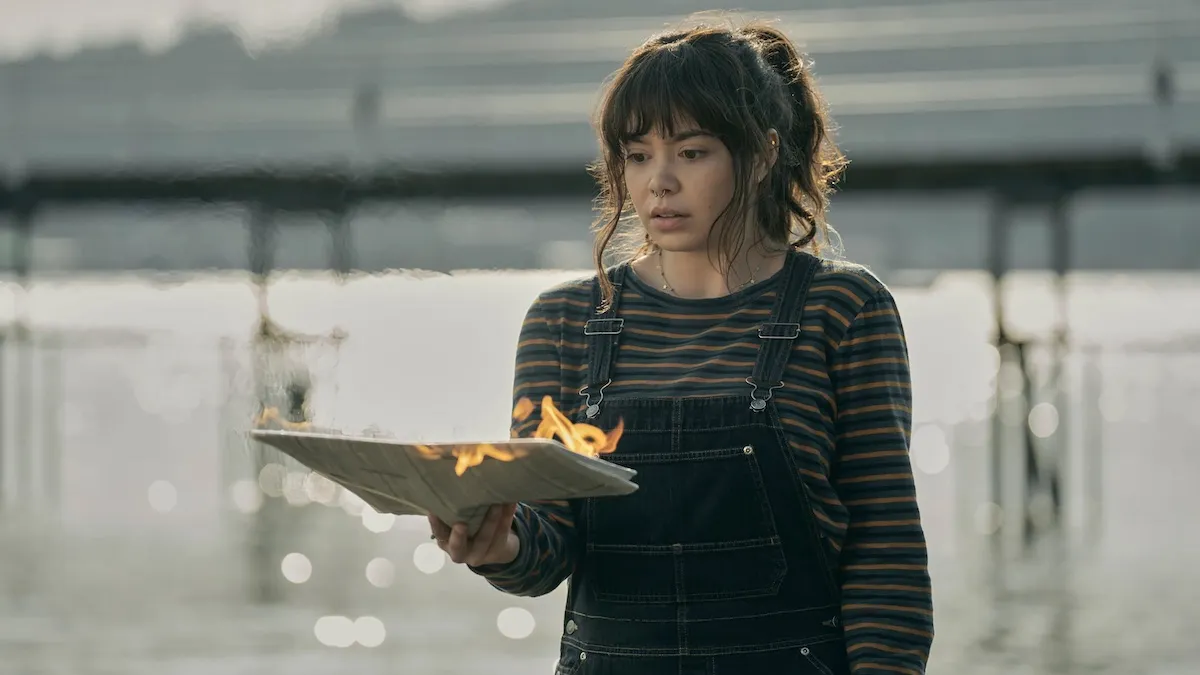In Amazon Studios’ The Power, based on the novel by Naomi Alderman, teen girls suddenly start developing a new organ called a skein, which gives them the power to shoot electricity from any part of their body. They soon learn that they can activate the power in older women, and the power quickly becomes a global phenomenon. Like the novel, the new series is a gripping, addictive drama—and it addresses a glaring problem in the book.
The story follows five women who develop the power: Jos (Auliʻi Cravalho), Margot (Toni Collette), Allie (Halle Bush), Roxy (Ria Zmitrowicz), and Tatiana (Zrinka Cvitešić). Margot is the mayor of Seattle; Jos is her disgruntled daughter. Allie is a girl in the American foster care system, who runs away after her foster father tries to rape her. Roxy craves acceptance from her father, a British crime lord, and Tatiana is the first lady of the fictional nation of Carpathia, the human trafficking capital of the world. As we follow their occasionally intertwining stories, we also follow Tunde (Toheeb Jimoh, known for portraying the sweet-natured Sam from Ted Lasso), a Nigerian journalist documenting the emergence of the power around the world.
Often, when a series has multiple storylines, some plots are more interesting than others. In The Power, though, every character’s story is equally engrossing. Each one comes into their power differently, and each one faces unique consequences for using it. Jos’s brother is radicalized by a misogynist hate group, while Allie becomes a prophet (or a scam artist, depending on whom you ask). Tatiana and Margot both face off against the powerful men around them, while Roxy, thanks to training videos she posts on the internet, becomes both a guide and a rival to the others.
The power also manifests in interesting ways. The most obvious way to use it is to zap someone in self-defense, but it can also manipulate the electrical impulses in other people’s bodies, or grow until it reaches superhero-like strength. Both Alderman and showrunner Raelle Tucker have thought deeply about the myriad possibilities of the power, and it shows.
However, the heart of the story’s drama lies in the swift and brutal backlash to women’s newfound strength. From rubber gloves to skein removal to good ol’ fashioned bullets, men and their allies crack down hard on the burgeoning global women’s movement. Every villain in the series comes up with a rationalization, but their true motive is clear: they feel entitled to control women and girls, and they want to keep doing it.
What makes the story so satisfying, though, is how clear it is that women can win this fight. The power is an ingenious plot device because it’s powerful. When you can paralyze an attacker with the slightest touch, the fear you’ve carried all your life melts away. Suddenly, men are the ones who need to carry tasers and look over their shoulders. The power carries implications not just for physical violence, but for all the indignities and microaggressions women are forced to bear every day.
However, there’s a dark side to that power, especially when it rises as suddenly and chaotically as it does here. Power corrupts, and the solution to a brutal hierarchy isn’t just flipping it. Readers of the original novel have at least a general idea of the seismic events to come, and the series does a good job hinting at them.
Of course, you might be wondering where all the gender nonconforming people are in The Power. Is this a world in which only cis people exist? The book definitely feels like it. Aside from one scene in which an intersex boy, Ryan, discovers he has a skein, the book centers squarely on cis women, and the absence of other marginalized genders is palpable. The series, however, expands Ryan (Nico Hiraga)’s storyline and adds a trans character, Sister Maria (Daniela Vega). (For the record, Alderman herself acknowledges the shortcomings of the novel and supports the change.)
From the excellent writing to the star-studded cast, there are no weak points in The Power. Critics were given the first eight episodes of season 1, and I can’t wait to see how the rest of the season unfolds. Here’s hoping for a season 2.
(featured image: Amazon Prime Video)










Published: Apr 12, 2023 06:51 pm